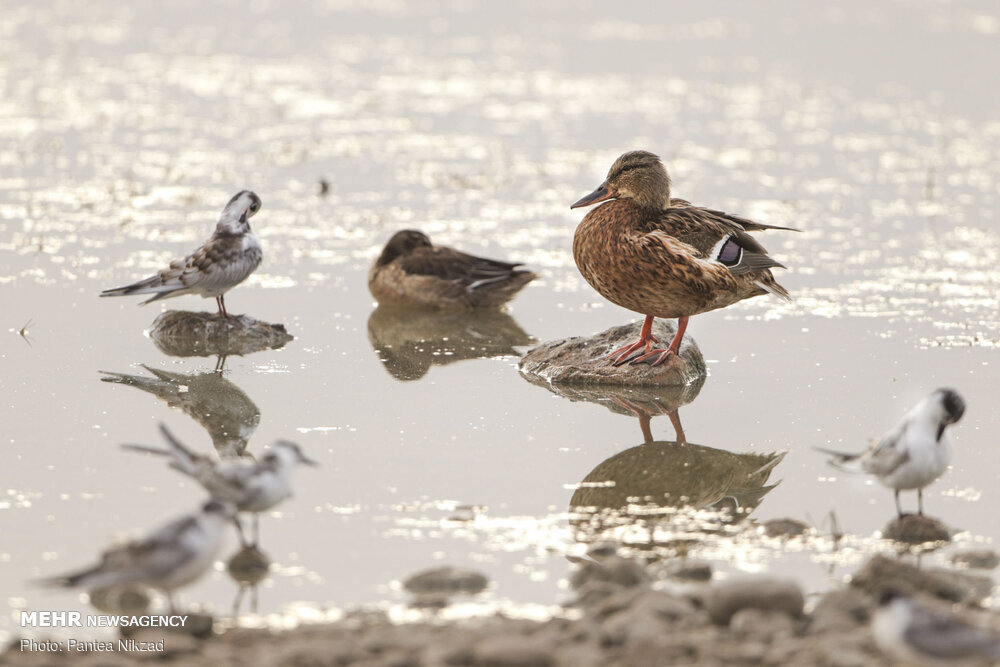Chaharmahal-Bakhtiari wetlands hosting 80 species of birds

TEHRAN – Some 80 species of migratory birds have come to winter in wetlands of the southwestern Chaharmahal-Bakhtiari province, Shahram Ahmadi, the provincial department of environment chief, has stated.
Currently, about 90,000 aquatic bird species are inhabiting in Choghakhor, Gandoman, Solqan, and Aliabad wetlands, he said.
According to Ahmadi, about 140,000 birds migrated to Chaharmahal-Bakhtiari wetlands this year, and with the freezing of Gandoman and Choghakhor wetlands, more than 50,000 moved to the southern regions of the country and the shores of the Persian Gulf.
These birds are from the family of storks, white and brown herons, ducks, Eurasian teal, egrets, flamingos, Grebes, coots, Bitterns, northern lapwing, gulls, and terns, he explained, IRIB reported on Saturday.
Gandoman wetland, stretching to 1,070 hectares, is located in Borujen county. It is one of Iran's top five birdwatching sites and the country's most important permanent habitat for migratory birds.
Located in Chaharmahal-Bakhtiari province, Choghakhor wetland is flowing on 1687 hectares, being designated as a hunting restricted area. It is also a birdwatching site that supports more than 47 bird species, with breeding populations of migratory birds such as the Northern Pintail (Anas acuta).
It supports more than 1 percent of the population of Gadwall (Anas strepera) and harbors threatened species such as the endangered White-headed Duck (Oxyura leucocephala) and the vulnerable Eastern Imperial Eagle (Aquila heliaca).
Unique birdwatching sites in Iran
Iran is decorated with impressive wetlands that hold a great share of aquatic and bird species and wildlife. Anzali wetland, Qeshm Island, Urmia Lake, and Miankaleh Peninsula are among the most important locations for bird watching in Iran.
Miankaleh International Wetland in Mazandaran, called the birdwatching paradise of Iran, stretches to a total area of 68,000 hectares, which is home to at least 130 species of migratory species with a population of 1.5 million.
Being an impressive bird-watching destination, the wetland displays a variety of bird species such as otters, all kinds of fish-eating ducks (common goldeneye and Mergus), pelicans, flamingos, and cormorants, common pheasants, partridges, mute swan, tundra swan, and coots. Ashuradeh was introduced and registered as one of the world's first biosphere zones in 1975.
Gomishan wetland in Golestan province is home to over 20,000 water birds, and more than 20 species of birds, which supports three IUCN Red List vulnerable species of waterbirds, i.e., Pelecanus Crispus, Aythya nyroca, and Vanellus gregarious, as well as the vulnerable mammal Phoca (Pusa) caspica; it is also an important staging area for the fish subspecies Rutilus rutilus caspicas.
Located at the foot of the Zagros mountains in north-western Iran, Zarivar is a freshwater wetland hosting over 74 bird species, which is designated as a Ramsar Site.
The site provides a suitable breeding and resting place for birds and other wetland animals, and due to the relatively extensive reed beds, it is an important overwintering site for northern migratory birds.
FB/MG
